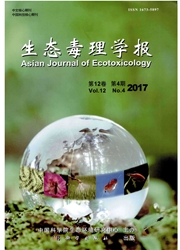

 中文摘要:
中文摘要:
探讨孕哺期全氟辛烷磺酸(PFOS)暴露对子代大鼠成年后糖代谢稳态的影响。Wistar孕鼠随机分组,自孕0天(GD0)起分别以0mg·kg^-1(对照组)、4mg·kg^-1(低剂量组)和8mg·kg^-1(高剂量组)PFOS(以饲料中PFOS计)经口染毒至仔鼠出生后21天(PND21)断乳为止。高效液相/质谱法检测PNDl、PND21和PND42时仔鼠血清PFOS含量。检测仔鼠断乳后第8周和第18周时空腹血糖和胰岛素水平计算胰岛素抵抗指数(HOMA—IR);比较仔鼠VI服糖耐量及肝脏糖代谢关键酶表达水平改变。结果显示:发育期PFOS暴露导致仔鼠出现血清中PFOS蓄积,以PND21时浓度最高,在低剂量组和高剂量组中分别为(7.77±145)μg·mL^-1和(5.09±O.57)μg·mL^-1与对照组相比,不同剂量组仔鼠在断乳前后均出现明显体重降低,并在成年后出现高胰岛素J舡症,但PFOS仅在雄性仔鼠中引起了血糖升高。18周龄时口服糖耐量结果显示,PFOS暴露使雄性仔鼠在该阶段出现糖耐量受损,同时造成过氧化物酶体增殖物活化受体γ协同刺激因子(PGC-γ)、磷酸烯醇丙酮酸羧激酶(PEPCK)表达水平的显著增高以及葡萄糖-6-磷酸脱氢酶(G6P)表达水平的显著降低。以上结果说明PFOS孕哺期暴露可引起子代成年后糖代谢失调,有增加糖尿病患病风险可能。
 英文摘要:
英文摘要:
Effect ofperinatal exposure to PFOS on glucose metabolism of adult rat offsprings was investiga- ted. The pregnant rats were exposed to PFOS with doses of 0 mg·kg^-1 PFOS (control), 4 mg·kg^-1 PFOS (low) or 8 mg·kg^-1 PFOS (high) through diet from gestation day 0 (GD 0) to postnatal day 21 (PND21). Serum PFOS concentrations were determined on PND1, PND21 and PND42 by HPLC-LC/MS. The rats' body weight wasmonitored during the experiments. Fasting blood glucose and fasting serum insulin level were measured at 8 and 18 weeks after weaning. Homeostasis model assessment insulin resistance index (HOMA-IR) was also cal- culated. Moreover, oral glucose tolerance test (OGTT) was performed on 18 weeks in male offspring after wea- ning and the area under curve was calculated. Besides, expression of glucose metabolism-related genes was measured using real-time PCR. The present study showed that serum PFOS concentration increased after ex- posure and the concentration was highest on PND 21, with (7.77 ±145)μg·mL^-1 at 4 mg·kg^-1 dose and (5.09 ±O.57)μg·mL^-1 at 8 mg·kg^-1 dose. Additionally, body weights of rat pups from PFOS exposure groups were sig- nificantly lower than control group. Though the fasting blood glucose levels were affected by PFOS only in male offspring, serum insulin levels were significantly elevated in all exposure groups. The degree of insulin resistance was also elevated and PFOS exposure could impair the glucose tolerance of male rat pups at 18 week. Furthermore, results from RT-PCR revealed that PFOS up-regulated the expression level of PGC-1 and PEPCK, while down-regulated the expression level of hypoglycemic gene G6P. In conclusion, developmental exposure to PFOS disturbed the glucose homeostasis of rat pups in the adulthood, led to insulin resistance and increased the risk of diabetes and metabolic disorder.
 同期刊论文项目
同期刊论文项目
 同项目期刊论文
同项目期刊论文
 Perfluorooctane sulfonate mediates microglial activation and secretion of TNF-α through Ca2+-depende
Perfluorooctane sulfonate mediates microglial activation and secretion of TNF-α through Ca2+-depende 期刊信息
期刊信息
